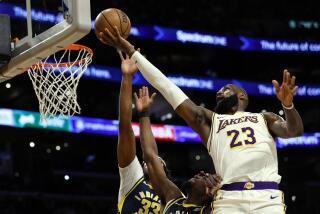Tilting at The Stilt
- Share via
And so it has come to pass, in this kidney stone of a Laker season, that the home team, finally, once again, is worthy of our undivided attention.
For this, the Lakers and their local broadcast affiliates have Kobe Bryant and his string of 40-point performances to thank. Bryant has scored at least 40 points in nine consecutive games, tying him with Michael Jordan for the third-longest streak in NBA history, behind only Wilt Chamberlain. And tonight, Bryant and the Lakers play the Clippers at Staples Center and, well, so long, see you later, MJ.
The streak has changed the way people view the Lakers -- there’s actually a reason to tune in again -- and how they talk about them.
Pre-streak: “What’s going on with the Lakers?”
Mid-streak: “Man, Kobe is going OFF!”
Sunday’s pregame show on Fox Sports Net was addled with anticipation as the Lakers prepared to play the Seattle SuperSonics.
Reggie Theus, very excited, kept talking about “Kobe being on fire,” despite video images to the contrary. There were several camera shots of Bryant warming up, in traditional fashion, covered only in sweat, not crackling flames.
“This is the longest fire I’ve ever seen!” Theus enthused. “It’s worse than the old Chicago fire!”
Oh doctor, is there a comedian in the house? Well, yes, there was Chris Rock, who was persuaded to come on down and spend a few minutes in front of a microphone with the Fox crew. Comics commenting on sports on television -- uh-oh, we’ve been down that road before. But Rock talking about basketball proved to be different than Dennis Miller talking about football in that Rock a) seemed to have some knowledge of the sport, and b) occasionally was funny.
“It’s Kobe Bryant and his offensive line right now,” Rock said. “They’re opening up holes and he’s getting his yardage.”
Theus asked Rock to describe how it feels “when you’re in your type of zone [on stage] and Kobe’s in his zone?” It was a silly question, and Rock treated it as such.
“My zone and Kobe’s zone?” Rock shot back, laughing at the comparison.
“Kobe’s funnier than me right now.”
Against Seattle, Bryant raced out to 35 points by the end of the third quarter, but spent much of the fourth quarter forcing shots as the seconds dwindled and he continued to chase 40. He finally got there with 23.6 seconds left -- clutch foul there by Rashard Lewis, giving Kobe a pair of free throws and a total of 41 points.
On the air, Stu Lantz chided Bryant for pressing too much and disrupting the Laker offense, calling the 40-point pursuit “a distraction.” Afterward, Bryant conceded as much to reporters, saying that he had to apologize to his teammates because he had become obsessed with “the challenge.”
From here, the challenge only gets steeper, perhaps impossibly so. Tied with Jordan for third on the list, Bryant next sets his sights on Chamberlain, who had two 40-point streaks of 14 consecutive games and another of 10.
As we have seen with other recent record pursuits -- Mark McGwire chasing Roger Maris, Cal Ripken overtaking Lou Gehrig, Emmitt Smith inching past Walter Payton -- the challenge becomes both an assault and a tribute to the record holder. Bryant’s scoring spree has brought with it new interest in Chamberlain, whose early-career scoring totals look like one typographical error after another.
Before Chamberlain joined the NBA in 1959, no player had averaged 30 points a game for an entire regular season.
In his rookie season, Chamberlain averaged 37.6 points a game.
His next season, 1960-61, Chamberlain upped that figure to 38.4
In his third season, Chamberlain, 25, decided to sacrifice his rebounding and concentrate more on scoring. He wound up averaging 50.4 points a game ... and 25.7 rebounds.
During that incredible 1961-62 season, which included his legendary 100-point game against the New York Knicks, Chamberlain:
* Scored 40 points or more in 14 consecutive games, then did it again.
* Scored 35 points or more in 33 consecutive games, a streak almost three times as long as Bryant’s string of 13.
* Scored 60 points or more 18 times.
* Finished with 4,029 points, nearly 1,000 more than Jordan had in his best scoring season, 3,041 points in 1986-87.
* Averaged 48.5 minutes a game, missing only eight of the 3,890 minutes played by the Philadelphia Warriors that season. The next time anyone wants to argue the merits of Shaq versus Wilt, throw that little nugget out there.
Chamberlain came back in 1962-63 and averaged 44.8 points a game, making the second-greatest scoring season in NBA history sound like a bit of a letdown.
Of course, it was a different league and a different game then. At 7 feet 1, Chamberlain towered over an NBA that featured the likes of Jim Krebs (6-8), Johnny Kerr (6-9), Wayne Embry (6-8), Zelmo Beaty (6-9) and Gene Conley (6-8) as starting centers. Chamberlain’s longtime rival and foil, Bill Russell, was listed at 6-10.
Unable to compete with Chamberlain in sheer size and strength, teams were forced to adapt in other ways, creating economy-sized scoring machines at other positions. In 1961-62, two years after Chamberlain became the first NBA player to average 30 points in a season, the league produced half a dozen: the Lakers’ Elgin Baylor (38.3) and Jerry West (30.8), Chicago’s Walt Bellamy (31.6), Cincinnati’s Oscar Robertson (30.8), St. Louis’ Bob Pettit (31.1) and Chamberlain.
Ironically, Chamberlain’s burst of individual dominance during the early ‘60s served mainly to remind that basketball is a game best played with five individuals working as one, not four sidekicks pounding the ball in to one individual. Chamberlain had his lowest scoring season to date, averaging 24.1 points, when he won his first NBA championship in 1966-67 with the Philadelphia 76ers.
By the time he won his second title, in 1971-72 with the Lakers, Chamberlain had recast himself as a defensive and rebounding specialist while the big-point headlines went to West, Gail Goodrich and Jim McMillian.
Those two championships were it for Chamberlain during his 14-year career. Bryant, at 24, a year younger than Chamberlain was during his 50.4 season, has already won three.
Bryant’s streak has kick-started a lethargic Laker season and quieted, for this week at least, local panic in the streets. The Lakers are back in the playoff mix.
But to stay there and get the defending champions in position for a reasonably conceivable run at four in a row, Bryant and those around him realize that Kobe’s big-number days are numbered.
Sunday, Paul Sunderland asked Lantz if Bryant could “possibly get up there with Wilt Chamberlain” and his record 14-game 40-point streak.
“I’ve learned in my time to never say never,” said Lantz, who’d just watched the Laker offense unravel in the fourth quarter around Bryant’s run at 40 and didn’t much like what he saw.
“I’m not going to say it never could happen. But I’d be surprised.”
*
*--* Wilt and the Forty-Niners Wilt Chamberlain is the only player in NBA history to have recorded more consecutive games of 40 or more points than Kobe Bryant (*twice): Player Games Season Wilt Chamberlain *14 1961-62 Wilt Chamberlain 10 1962-63 Kobe Bryant 9 2002-03 Michael Jordan 9 1986-87 Wilt Chamberlain 8 1961-62 Wilt Chamberlain *7 1962-63 DIPPING INTO HISTORY Wilt Chamberlain owns top consecutive-game streaks of scoring 35 points or more (*over two seasons): Player Games Year Wilt Chamberlain 33 1961-62 Wilt Chamberlain 23 1962-63 Wilt Chamberlain 20 1961-62 Kobe Bryant 13 2003 Michael Jordan 10 1986-87 Elgin Baylor *9 1961-63
*--*
*
*--* How They Compare Comparing Wilt Chamberlain’s first seven seasons with Kobe Bryant’s: WILT Team Pts KOBE Pts ‘59-60 Phila 37.6 ‘96-97 7.6 ‘60-61 Phila 38.4 ‘97-98 15.4 ‘61-62 Phila 50.4 ‘98-99 19.9 ‘62-63 S.F 44.8 ‘99-00 22.5 ‘63-64 S.F 36.9 ‘00-01 28.5 ‘64-65 S.F.-Phila 34.7 ‘01-02 25.2 ‘65-66 Phila 33.5 ‘02-03 30.8 * Chamberlain led league in scoring in each of his first seven seasons. * Chamberlain holds season record for most games scoring 50 or more points (45, in 1961-62). * Chamberlain holds season record for points (4,029 in 1961-62). * Chamberlain holds season record for highest points-per-game average (50.4, in 1961-62). * Chamberlain holds career record for most 50-point games (118), most seasons leading league in field goal percentage (nine), most rebounds (23,924), highest per-game rebound average (22.9). Note: Bryant has not led NBA in any offensive category his first seven seasons. He has scored 40 or more points in nine consecutive games this season
*--*
More to Read
All things Lakers, all the time.
Get all the Lakers news you need in Dan Woike's weekly newsletter.
You may occasionally receive promotional content from the Los Angeles Times.






